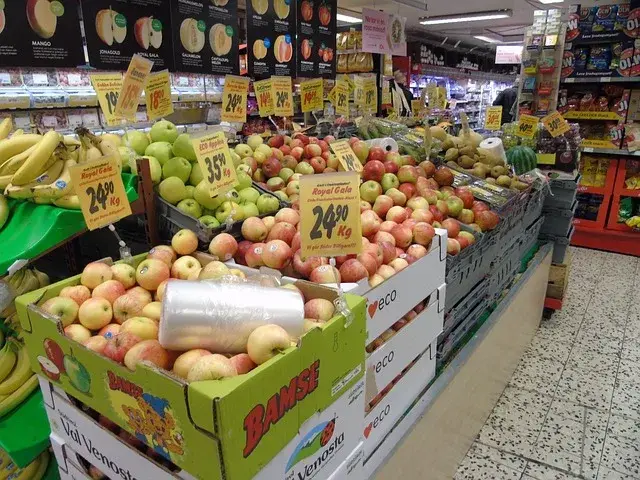Kenyans and other people worldwide have noticed the importance of fruits in their daily meals. As a result, the fruit business in Kenya has been booming in the busy streets and markets across the country.
That said, I managed to interview a fruit businessman in Makueni County, Mutua. A good percentage of the fruits sold in Kenya are from Ukambani, the three counties.
In this blog, Mutua will take us through how he started farming and selling fruits in Kenya, how he’s fairing, and the challenges he has faced in the business.
Cecilia: Thank you, Mutua, for accepting my request to visit your business. I know you are a busy man, and it has taken dedication to accept me here. So, let’s get started so I don’t take much of your time. Please begin by telling us more about yourself in the fruit business in Kenya.
Mutua: Thank you, Cecilia, for taking your time. I really appreciate and love the work you are doing. Keep it up. I started in this business in 2017 after graduating from the University. I started the stall as something I could pass the time with before getting a ‘white colour job’—something that never happened.
Read Also: Business to start with 1k in Kenya.
How To Start a Small Fruit Business in Kenya?

I started with a capital of Ksh. 20k. I spent 5k for stall rent, 5k for business permit, 2k for health licence, 3k for shelves, and 5k to buy my first stock lot.
I took a local fundi, and we worked together to make display shelves at the stall. The good thing is that I had trees that I hired some guy to cut timber, so the 3k was for labour and other things such as nails.
After the stall was ready, I got oranges from local farms around Makueni. Oranges and pixies were in season, so getting them wasn’t an issue. However, I planted some orange, pixies, and mango trees before college.
I also ensured I bought on a small scale to avoid damage since I was just starting up and didn’t have frequent customers. However, with time, I developed my client base and would buy more stock two or three times a week.
One thing you should know about the fruit business in Kenya is that you should store them in open containers like crates. In addition, your shelves should also have huge spaces to facilitate air circulation.
I continued selling at my stall until 2021, when a frequent buyer requested me to deliver a certain amount of fruits to her business in Nairobi. It was such a great opportunity, and I had to take the chances anyway.
So I started delivering her orders, and she would pay me promptly. The good news is that my fruit trees had started yielding more at this time, and I was glad to have a ready market. However, I didn’t close my stall in Makueni. Instead, I left my wife to run the business.
Cecilia: What a fantastic journey! What about your degree? Didn’t you bother searching for a job?
Mutua: Well, I have a Purchasing and Supply Chain Management degree. Actually, after one year in the business, I was making some good profits, and I thought it wasn’t worth it to sacrifice my freedom and the business, so I kept going.
Cecilia: Wow. I also have the same bachelor’s degree. But what I like most is the ability to diversify the knowledge we get from school and do something great. We can’t all fit in the job market.
So, is the fruit business in Kenya profitable?
Read Also: Side hustles for students in Kenya
Is Fruits Business Profitable in Kenya?

Mutua: Yes. The fruits business in Kenya is very profitable. You only need to balance your buying and selling costs.
For instance, sourcing your fruits directly from the farmer is always a good idea.
Even if you are not near fruit production areas, you should search for contacts to do business with the farmer. This will leave you with significant margins you wouldn’t have gotten from a broker/middleman.
However, if you cannot afford to get the fruits from the farmer, you can start from brokers and upgrade as days pass. Always start a fruit business in Kenya or any other business to grow it to something big.
With time, I started sourcing these fruits from my farm, increasing the profits I got from the business. Therefore, if you have the opportunity to grow your own fruits, just take it, and within some years, you will be reaping big.
To maximise your profits, you must avoid damages as much as possible. If possible, you can buy a fridge to keep some of the fast-ripening fruits such as mangoes. This will help you save from any losses from rotten fruits.
I use value-addition methods to increase the profitability of my fruit business in Kenya. Actually, I have several fruit stalls in Nairobi and Nakuru.
The overall way that I maximise my fruits business profits is by reducing expenses in the most applicable way. In addition, I also have a clear record and a system where I keep my business and farm records. I try to keep off from the business funds.
I’m thrilled that the fruit business has enabled me to buy a pickup and a canter for fruit transportation. So, it’s that profitable to run a fruit business in Kenya.
Cecilia: That’s impressive. Please tell us more about your value-addition methods to maximise your fruit business profits.
Fruit Business in Kenya: Value-Addition Methods
Mutua: Value-addition keeps most fruit businesses in Kenya, including mine, going forward.
Here are the value-addition methods I use for all my fruit businesses in Kenya:
- Making Fruits Salad

Fruit salad brings significant profits for all my businesses in Kenya. We make fruit salad from mangoes, slices of pixies, avocado, watermelon, pawpaw, redberries, and beetroots.
A plate of fruit salad goes for Ksh. 50, and my employees hawk them at the bus stops and busy streets in Nairobi and Nakuru.
- Making Fruits Juice

Fruit juice is another way to profit more from a fruit business in Kenya. I have a fridge, a blender, and a fruit mixer in all my fruit outlets in the country. In addition, these outlets’ employees have experience making fruit smoothies according to customer requests. A glass of fruit juice goes for Ksh. 50.
- Exports
Doing fruit exports is another way I add value to my fruits. The external market is always great since we are paid in US dollars. As you know, the Dollar is gaining value against the Kenya Shilling.
During the onset of fruit harvest, before congesting the market, I usually find enough stock for export from my farm and the neighbouring farms. At this time, for instance, we sometimes sell a kilogram of pixie fruits at Ksh 250— a price I cannot get from the Kenyan market.
Cecilia: Wow, Mutua, you are making some good cash. I hope my readers will also implement your strategies and make a kill. Please tell us if you face any challenges in the fruit business in Kenya.
Challenges I Have Faced in this Business in Kenya
Mutua: Like any other business, I have faced challenges in my fruit business in Kenya. But like I say, challenges come to sharpen us. So, here are the challenges I have faced in the fruit business in Kenya.
- Damages
Until I learned to store fruits during the start of my business, I incurred many losses through rotten fruits. Some fruits would just go bad because of warm weather.
I even opted to buy an air conditioner to regulate the temperature at some point in my business. That reduced the losses for some time, but then I planned a good way to store the fruits.
- High fuel costs
Right now, every business out there is complaining about fuel prices. I started my business when diesel was less than Ksh.100 per litre, and now it’s above Ksh.200. Such a significant deviation has crippled most businesses you see around.
The high fuel prices pose a significant challenge when transporting fruits across my outlets. Since I source the majority of fruits from Makueni, I’m incurring lots of expenses pertaining to fuel.
- Employee theft
I have fired several employees from my stalls because of greed and theft. Most of those I fired could sell, pocketing the cash, especially the fruit juice and salads.
How I wish that people could take their jobs seriously and work for their bosses’ best interest. We could be far as a country if most employees could choose honesty.
Cecilia: I’m sorry for the challenges in your fruit business in Kenya. I’m also glad that you’ve taken the time to enlighten other fruit vendors and upcoming vendors. You’ve not been mean with information, and I appreciate that.
Mutua: Cecilia, thank you for the work you are doing. We need enthusiasts like you in our community.
To Conclude
Wow! You’ve all heard from Mutua himself on how he started a fruit business in Kenya. As you’ve seen, starting and growing a business in Kenya takes dedication and determination.
Maybe you could think of the value-addition techniques that Mutua uses to increase the profitability of his business.
Read Also: Businesses to start with 10k In Kenya.
Frequently Asked Questions
- How profitable is the fruit business?
According to Mutua, a fruit vendor from Makueni, the fruit business is profitable enough to make you buy what you need. But here is the catch—focus more on value addition to reap the utmost benefits.
- Which is the most available fruit?
The banana is the most available fruit throughout the year, although the availability might reduce during the dry seasons.
- How do you start a small-scale fruit business in Kenya?
You can start a fruit business in Kenya by finding a busy street to rent a stall, paying the rent, getting the business permits and health licence, and buying fruits.

